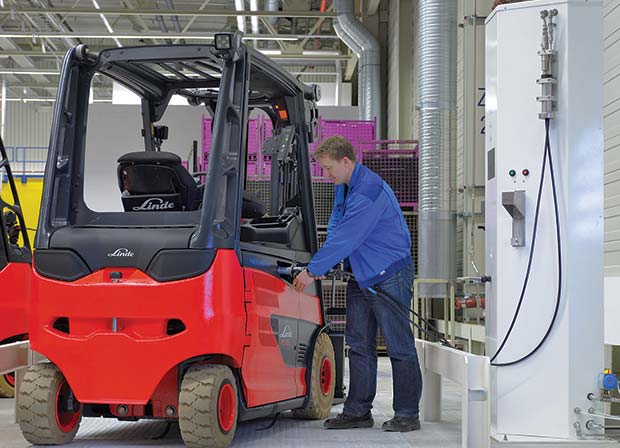A new collaborative research project, H2IntraDrive, has proved that using industrial trucks with hydrogen drive is the most sustainable and cost-effective way of powering materials handling equipment in the automotive industry.

The project, led by the BMW Group, Linde Material Handling and the fml Institute of Technical University Munich (TUM), investigated the viability of using hydrogen drive systems in fork lift trucks and tow tractors and confirmed an increase in overall productivity.
As part of the project, TUM’s Institute for Materials Handling Material Flow and Logistics (fml) carried out an independent survey which showed 93% of industry experts regard the use of hydrogen as a power source to be beneficial, however 80% feel they are insufficiently informed about the potential opportunities that hydrogen drives can produce.
TUM researchers compared electric and hydrogen drive systems based on the following parameters: energy efficiency, reliability, durability and environmental and economic sustainability. Conducted at the BMW Group’s plant in Leipzig, scientists established, among other things, an improved life cycle of the trucks, after carrying out near-practice calculations for a fleet of 50 vehicles.
They found while a conventional battery change can be carried out in five minutes, a hydrogen powered tow tractor can be refuelled in just one and a half minutes. With hydrogen powered forklift trucks, the refuelling process is five times faster compared to replacing a comparable battery.
As well as a saving in time, the report also highlighted the fact that the costly equipment and infrastructure normally required for battery powered machinery would no longer be necessary with hydrogen power. Linde CSO, Christophe Lautray: “The fact hydrogen technology has successfully completed this endurance test in BMW production and has reached market maturity is an important signal for our customers.
From this research, we were able to gain important insights to help us further develop our vehicles. We see ourselves as an industry pioneer and with this project we have once again substantiated our claim to be technology leader.”
Compared to conventional electric vehicles, the operating range of the hydrogen-powered tow tractors was above standard, while the operating range of the forklift trucks was lower. A larger tank volume and higher tank pressure will resolve this issue in the future. FML chair holder at TU Munich, Prof. Dr. Willibald A. Günthner: “We judge the results of our research project to be a clear success for logistics in Germany on its road to pioneering a new alternative drive technology. Our research report documents the achievement of an important intermediate goal. Further questions and detailed refinements can be explored in follow-up projects”
The research leading to this report was funded by The Federal Ministry of Transport and Digital Infrastructure in Germany via a grant of EUR 2.9 million as part of the National Innovation Programme for Hydrogen and Fuel Cell Technology (NIP).




Comments are closed.